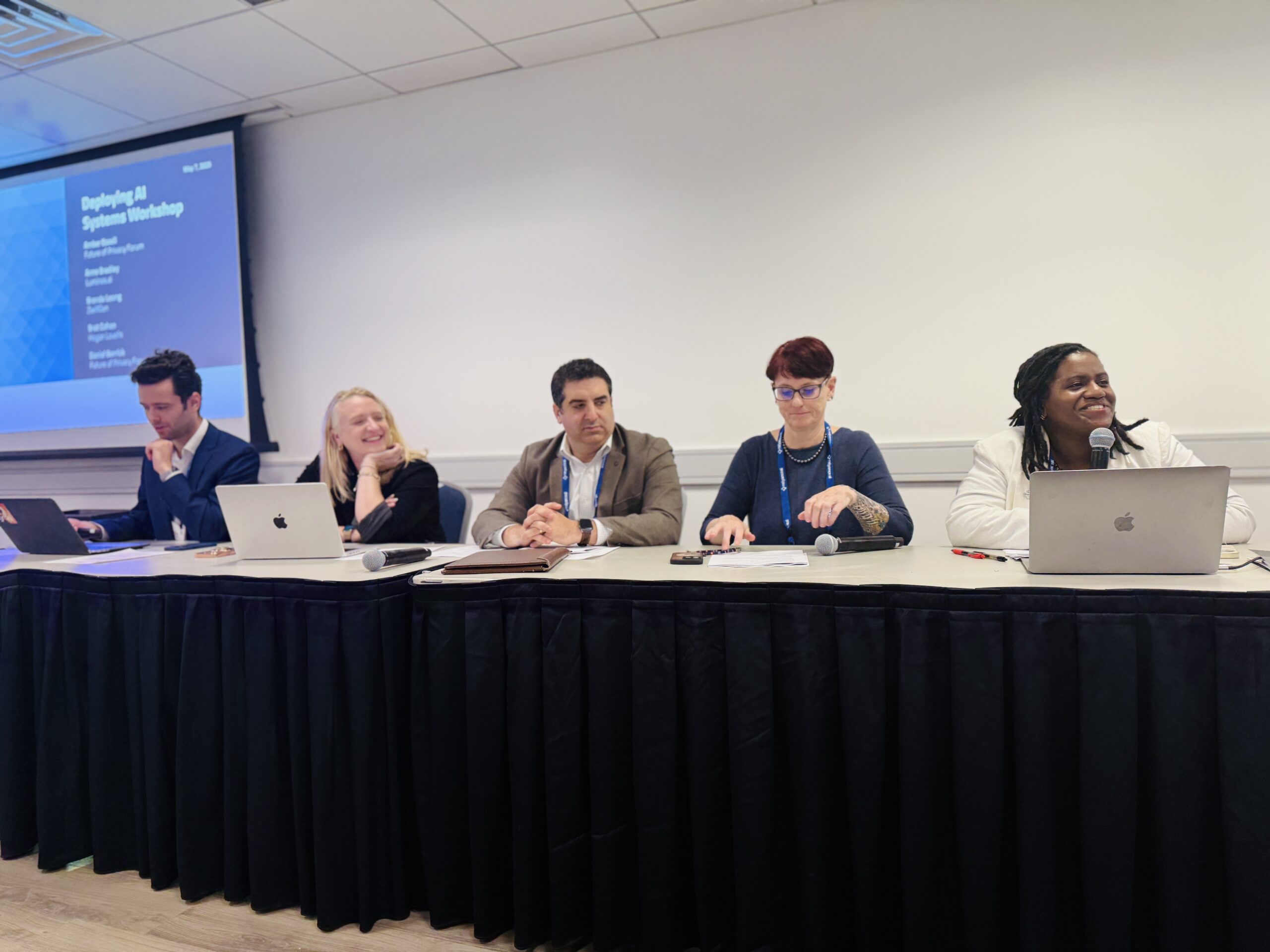Annual DC Privacy Forum: Convening Top Voices in Governance in the Digital Age
FPF hosted its second annual DC Privacy Forum: Governance for Digital Leadership and Innovation on Wednesday, June 11. Staying true to the theme, this year’s forum convened key government, civil society, academic, and corporate privacy leaders for a day of critical discussions on privacy and AI policy. Gathering an audience of over 250 leaders from […]
FPF Experts Take The Stage at the 2025 IAPP Global Privacy Summit
By FPF Communications Intern Celeste Valentino Earlier this month, FPF participated at the IAPP’s annual Global Privacy Summit (GPS) at the Convention Center in Washington, D.C. The Summit convened top privacy professionals for a week of expert workshops, engaging panel discussions, and exciting networking opportunities on issues ranging from understanding U.S. state and global privacy […]
Lessons Learned from FPF “Deploying AI Systems” Workshop
On May 7, 2025, the Future of Privacy Forum (FPF) hosted a “Deploying AI Systems” workshop at the Privacy + Security Academy’s Spring Academy, which took place at The George Washington University in Washington, DC. Workshop participants included students and privacy lawyers from firms, companies, data protection authorities, and regulatory agencies around the world. The […]
FPF Launches Major Initiative to Study Economic and Policy Implications of AgeTech
FPF and University of Arizona Eller College of Management Awarded Grant by Alfred P. Sloan Foundation to Address Privacy Implications, and Data Uses of Technologies Aimed at Aging At Home The Future of Privacy Forum (FPF) — a global non-profit focused on data protection, AI and emerging technologies–has been awarded a grant from the Alfred […]
Chatbots in Check: Utah’s Latest AI Legislation
With the close of Utah’s short legislative session, the Beehive State is once again an early mover in U.S. tech policy. In March, Governor Cox signed several bills related to the governance of generative Artificial Intelligence systems into law. Among them, SB 332 and SB 226 amend Utah’s 2024 Artificial Intelligence Policy Act (AIPA) while […]
FPF Releases Infographic Highlighting the Spectrum of AI in Education
To highlight the wide range of current use cases for Artificial Intelligence (AI) in education and future possibilities and constraints, the Future of Privacy Forum (FPF) today released a new infographic, Artificial Intelligence in Education: Key Concepts and Uses. While generative AI tools that can write essays, generate and alter images, and engage with students […]
Minding Mindful Machines: AI Agents and Data Protection Considerations
Thank you for the contributions of Rob van Eijk, Marlene Smith, and Katy Wills We are now in 2025, the year of AI agents. In the last few weeks, leading large language model (LLM) developers (including OpenAI, Google, Anthropic) have released early versions of technologies described as “AI agents.” Unlike earlier automated systems and even […]
Twelve Privacy Investments for Your Company for a Stronger 2025
FPF has put together a list of Twelve Privacy Investments for Your Company for a Stronger 2025 that reflects on new perspectives on the work that privacy teams do at their organizations. We hope there is something here that’s useful where you work, and we’d love to hear other ideas and feedback. Privacy Investments for Your […]
FPF’s Year in Review 2024
With contributions from Judy Wang, Communications Intern 2024 was a landmark year for the Future of Privacy Forum, as we continued to grow our privacy leadership through research and analysis, domestic and global meetings, expert testimony, and more – all while commemorating our 15th anniversary. Expanding our AI Footprint While 2023 was the year of […]
OAIC’s Dual AI Guidelines Set New Standards for Privacy Protection in Australia
On 21 October 2024, the Office of the Australian Privacy Commissioner (OAIC) released two sets of guidelines (collectively, “Guidelines”), one for developing and training generative AI systems and the other one for deploying commercially available “AI products”. This marks a shift in OAIC’s regulatory approach from enforcement-focused oversight to proactive guidance. The Guidelines establish rigorous […]










